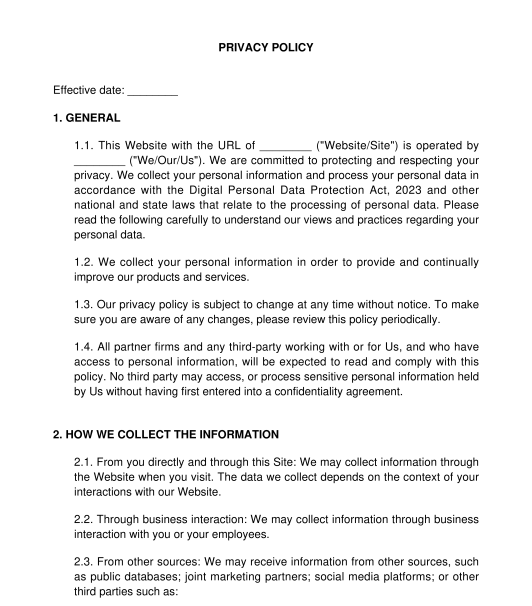 02-04-2025
02-04-2025

Answer a few questions and your document is created automatically.

Your document is ready! You will receive it in Word and PDF formats. You will be able to modify it.

 02-04-2025
02-04-2025
 Word and PDF
Word and PDF
 6 to 9 pages
6 to 9 pages
The Privacy Policy is a document that informs users about the use, processing, and disclosure of their personal information collected through a website or mobile application. It is required for any industry using a website or mobile application and collect personal data such as name, email, phone number, etc. This applies to various industries including healthcare, finance, e-commerce, transportation, and more.
Any website or app that gathers any data about its users, even if it is simply through tracking their location, is required to have a Privacy Policy.
Website Terms and Conditions define how the user can use the Website/Application and the obligations of the Users and the owners of the Website/Application. Website Terms and Conditions also include details about how the business works, delivery and return policy, the geographical location of the business, age restrictions, dispute resolution and so on. On the other hand, a Privacy Policy is a detailed document explaining how the owner of the Website/Application deals with the personal information of the users such as the details about the uses of information, how the information is collected, what information is collected, retention and deletion of information, age restrictions, security methods adopted, etc.
Yes, It is mandatory under the law to notify users and get their consent before collecting and processing their information. Moreover, it helps establish legal grounds and avoid potential disputes.
Personal data also referred to as personal information is any kind of information that can identify a particular person. The personal data includes direct details like name, address, date of birth, etc. and indirect details IP address, browsing history, etc.
Sensitive personal data also known as special category personal data is such personal data that requires extra protection and care while dealing with it. This includes information regarding political opinions, religious beliefs, biometric data, sexual orientation and so on.
The Privacy Policy should be published and easily accessible on the website and mobile application, preferably in the footer of the homepage. It's best to obtain the user's consent online and record it for future reference using an "I Agree" button or a pop-up window. The Privacy Policy should be regularly reviewed and updated to reflect changes in situations.
Privacy Policies are usually accompanied by two other important policies: a website's terms and conditions and a cookies policy. The website's terms and conditions cover the responsibilities of the website owner and users, IP rights, accepted use of the website, disclaimers, etc. On the other hand, a cookies policy explains the cookies used by the website or third-party cookies connected to the website. These major policies are often displayed on the home page of the website. If the website ships products, a separate shipping policy can be used.
It is important to cover the following important clauses or information in the Privacy Policy:
The content of the Privacy Policy is mainly outlined in the Digital Personal Data Protection Act of 2023 and it is mandatory under this law to get prior consent from the users before collecting and processing their personal data. General laws of the Indian Contract Act of 1872 and the Information Technology Act of 2000 also apply for a Privacy Policy.
You fill out a form. The document is created before your eyes as you respond to the questions.
At the end, you receive it in Word and PDF formats. You can modify it and reuse it.
A guide to help you: How to Protect your Online Businesses?
Country: India